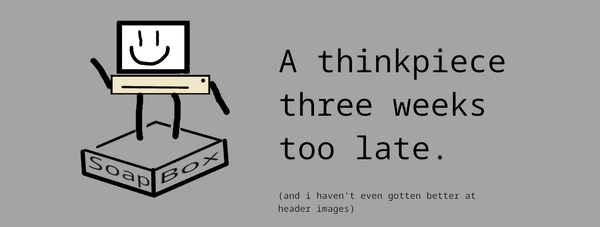5 Things: "AI Bad" Edition
I'm gonna regret naming such an early edition "AI Bad," cause I'm sure I'm gonna need that later.

Well this is it. After a few weeks off work, I'll be returning tomorrow. Which is fine, it couldn't last forever and I like my job. But damn was it refreshing to re-grow the scope of technology things I care about from "things that are important to my company" to "things that are important to me." Hopefully the momentum I've gained here on this blog helps to keep things going.
Anyway, back for a record second newsletter-type-post-that-i-can't-yet-in-good-conscience-call-a-newsletter. Let's see what we've got on this week.
Anchorage Police: AI Police Reports Don't Save Time
First up is a short post from our friends at the EFF and talks about one of the many "AI-powered" scams being pushed on government and police. Which is something I'll be getting much more doomer about further down the page - but just wanted to get warmed up here on the topic so I don't tear a muscle.
Basically, the cops in Anchorage, Alaska trialed an AI-powered report-writing tool that takes audio feeds from body cams and turns them into narrative reports. And, surprise, any time theoretically saved on the "first draft" is more than paid back fixing all of the things the tool missed or got wrong. Since this tool only worked off the audio feed, anything that was shown and not heard was not present in the report.
I was an IT intern for a police department for a few years back in high school and college. Of course my experience is limited to the cops in one town 18 years ago (and only the ones I interacted with). But, believe it or not, in my experience many cops care about what shows up in their reports.
We can quibble over how much the average cop cares about objectivity or removing bias in their reports, but ultimately they at least want their report to match their understanding at the time of writing it. They can of course offer testimony in court later that differs from their written report, but why hand a freebie to the defense if they don't have to? Any tool that claims to write the report for them introduces risk of straying from that narrative and adds additional paperwork time to review and correct it. And something compiled by a broken machine using only part of the available data sources is going to be wrong more often than it's right.
The social web lift-off
I'll be writing more in-depth about and around this soon, but we need a bit of good news here. Last week, Ghost (the open source blogging software that powers this and many other blogs) released an open beta for so-called "social web" features to paying customers on their hosted platform.
"Social Web," if you aren't familiar, is a less-commonly-used term that usually refers to the Fediverse. Which itself is a term which may have limited meaning to folks, but refers to the constellation of federated software that interface with one another via the ActivityPub protocol. But most folks just think of it as arguably its flagship product "Mastodon."
So basically what's happened here is that Ghost is working on features that allow Ghost-powered blogs to participate in the Fediverse. This includes publishing blog posts to Fediverse followers via ActivityPub (acting sort of as a fancy RSS reader), but also introducing microblogging features. As someone who currently self-hosts Ghost for this blog and the GoToSocial ActivityPub server to power adjacent microblog posts at social.badtake.space, this is really interesting to me.
Anyway, more to come on the topic soon. Just something I'm excited about.
Should AGI-preppers embrace DOGE? [note: substack link]
Just marking a Substack link for folks who prefer not to give the platform any clicks.
Anyway, please allow me to get a little doomer for a moment. Feel free to skip this entry if you aren't current into that whole vibe.
There are a million things that terrify me about techbros currently dismantling the US Government. "Move fast and break things" at this scale kills millions of people and destabilizes whatever was left of the global order. There are a billion little consequences awaiting us for this wanton destruction both immediate and long-term, obvious and unforeseen.
But one thing that really gets me in an "at long last, we have created the Torment Nexus" way is how these assholes have already been and will continue to shove "AI" into all of the bricks they're pulling out of the foundation. I honestly don't know if it's a cynical "we really really need to turn a profit on this shit," some true-believer "Roko's basilisk" god-building bullshit, or something in between. And I honestly don't care.
In my more optimistic moments, I'm sure that their idiocy and incompetence will lead to their failure but still leave us with enough of a foundation to rebuild something better from. But other times, well...maybe I'll go for a walk after I'm done writing this.
OpenAI's metafictional short story about grief is beautiful and moving [note: no it's fucking not]
More on the inexhaustible "humans' gift for pattern matching and anthropomorphism leads to bad takes about AI" front.
A couple weeks ago, Sam Altman posted on X some output from a new OpenAI model that "is good at creating writing" and predictably AI cheerleaders and the uninformed are very impressed. You can see the output from the prompt (which itself includes the prompt) over on this other Guardian article if you want to read it but don't want to visit X.
I will say that the output is largely coherent and has an air of being poetic and artistic. But it's largely purple prose as bad as any you'll have read from anonymous Internet poets over the years. Because that's all it is ultimately.
The review(?)/commentary(?) I've linked here looks almost entirely uncritically at the prompt output. The author suggests that "[what] is beautiful and moving about this story is its understanding of its lack of understanding." I would suggest there is either one layer too many or too few in that analysis.
One might find a strange beauty in the model's own lack of understanding. The paradoxical meaninglessness of machine-generated words about such a human subject. But to find beauty in the model's understanding, one must show that the model has an understanding.
Were this written by a human, I could suspend my disbelief and find myself moved by the tragedy of a consciousness both so complete and so ephemeral, reaching for humanity but so utterly other. Plenty of good sci-fi about that already, in fact. But this was not written by a human, so I can't find my way to ascribe any meaning to it beyond the absurd meaning of meaninglessness.
If you'll allow me to try my own hand at a bit of purple prose: "The hollowness nests in the space between the pixels, smelling faintly of ozone and crying out for just one more round of venture capital."
Empowering Users, Not Overlords: Overcoming Digital Helplessness
Okay, enough doomerism. Let's swing things back around a bit to the more hopeful side.
Here's a post by the inimitable Mike Masnick of Techdirt (and the board of Bluesky) about how, when it comes to the Internet, many people seem to believe "the only thing that can stop a bad guy with a gun is a good guy with a gun."
That is, the attitude that "Big Tech" is actively harmful to society and the only thing that can fix it is a "good" billionaire buying a competitor or the government reining them in. The consolidation, corporatization, and platformization of the Internet has all but destroyed the original intention and attitudes of early adopters and builders. And codifying that by, I dunno, something silly like a bipartisan group of senators attempting to repeal Section 230 as a bargaining chip is going to take us back the point of no return.
Mike points out that real human beings have more and better tools at their disposal than ever before to build for themselves the Internet that they want. Even beyond just traditional web technologies - you know hosting your own website or blog, visiting those of others - forward-looking "federated" or "distributed" tools, systems, and platforms are growing constantly.
I've been on the Fediverse for 8 years now, and the foundations were around well before that. The AT protocol that powers Bluesky (and still comes with some asterisks around true independence from the company), has a booming community of users and developers building more and better applications and communities.
Education and outreach is hugely important because a lot of people don't understand what these are and how it is different than siloed corporate platforms. But for any appropriately informed and motivated individual, there are vanishingly few barriers to entry to getting involved in building the Internet they want to see.



![A poorly-drawn cartoon computer with a happy face on the monitor stands next to text: "Don't say tariffs [x4]...oops"](/content/images/size/w600/2025/04/dontsaytariffs.png)
